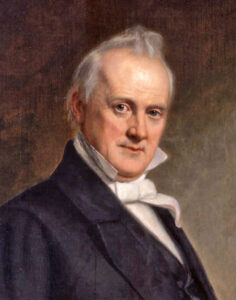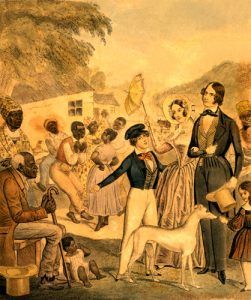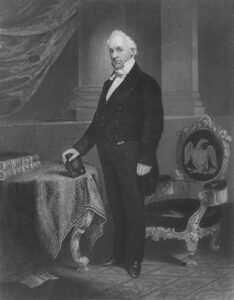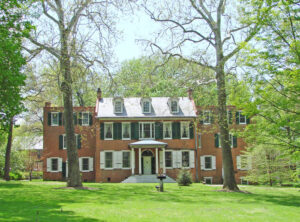James Buchanan was a lawyer, diplomat, and the 15th President of the United States, who served immediately before the Civil War. He remains the only president to be elected from Pennsylvania and is a lifelong bachelor.
James Buchanan Jr. was born on April 23, 1791, in a log cabin in Cove Gap, Pennsylvania, to James Buchanan Sr. and Elizabeth Speer Buchanan. His parents were both of Scotch-Irish descent, and his father emigrated from Ramelton, Ireland, in 1783. Shortly after Buchanan’s birth, the family moved to a farm near Mercersburg, Pennsylvania, and in 1794 the family moved into the town. His father became the wealthiest resident there, working as a merchant, farmer, and real estate investor.
James attended the Old Stone Academy in Mercersburg and then Dickinson College in Carlisle, Pennsylvania. He was nearly expelled for bad behavior but pleaded for a second chance and ultimately graduated with honors in 1809 at the age of 18. Later that year, he moved to the state capital, Lancaster. James Hopkins, a leading lawyer there, accepted Buchanan as an apprentice. A gifted debater, he was admitted to the Pennsylvania bar in 1812. Many other lawyers moved to Harrisburg when it became the state capital in 1812, but Buchanan made Lancaster his lifelong home. Toward the close of the War of 1812, he went as a volunteer soldier to the defense of Baltimore, Maryland, in 1814 but had no occasion for fighting. Buchanan was the only president with military experience who was not an officer.
Afterward, he returned to his career as an attorney, and his income rapidly rose after he established his practice. By 1821, he was earning over $11,000 per year (equivalent to $220,000 in 2021). He handled various cases, including a much-publicized impeachment trial in which he successfully defended Pennsylvania Judge Walter Franklin.
He began his political career as a member of the Federalist Party and was elected to the Pennsylvania House of Representatives in 1814 and 1815. The legislature met for only three months a year, but Buchanan’s service helped him acquire more clients. Politically, he supported federally funded internal improvements, a high tariff, and a national bank. He became a strong critic of Democratic-Republican President James Madison during the War of 1812.
In 1820, he was sent to Congress as a representative of the Lancaster District, and he was kept there by reelection until 1831. During that long service, he was ranked among the leading members for ability and industry. During the last two years of his service there, he was chairman of the Judiciary Committee. He was appointed by President Andrew Jackson, in 1831, the American minister to the Russian Court, where he remained for only two years. On his return in 1833, he was chosen by the Pennsylvania Legislature to represent that State in the National Congress.
For 12 years, he was a member of the Senate and was regarded as the leader of the Democratic party in that body. There, he strenuously opposed all agitation on the subject of slavery. During his political life, he was a zealous and consistent supporter of the policy of the slaveholders and minimized the role of the federal government preceding the Civil War.
He was President James Polk’s Secretary of State from 1845 to 1849 and was influential in shaping Polk’s policy regarding the Mexican-American War.
From the close of Polk’s administration until the accession of President Franklin Pierce in 1853, he remained in private life. He then became President Pierce’s Minister to Great Britain. It was during his residence at that court that a conference of American ministers in Europe, held, at his suggestion, at Ostend, issued a “ manifesto ” concerning the purchase or seizure of Cuba, which forms one of the most disgraceful records in American diplomacy. However, his service abroad helped to bring him the Democratic nomination in 1856 because it had exempted him from involvement in bitter domestic controversies.
As President-elect, Buchanan thought the crisis erupting over slavery would disappear if he maintained a sectional balance in his appointments and could persuade the people to accept constitutional law as the Supreme Court interpreted it. The Court considered the legality of restricting slavery in the territories, and two justices hinted to Buchanan what the decision would be.
Thus, in his Inaugural in 1857, the President referred to the territorial question as “happily, a matter of but little practical importance” since the Supreme Court was about to settle it “speedily and finally.” Two days later, Chief Justice Roger B. Taney delivered the Dred Scott decision, asserting that Congress had no constitutional power to deprive persons of their property rights regarding slaves in the territories. Southerners were delighted, but the decision created a furor in the North.
His administration was marked by an intense agitation over the slavery question, culminating in the Civil War in Kansas. Tall, stately, and stiffly formal, he presided over a rapidly dividing Nation, inadequately grasping the political realities of the time. Relying on constitutional doctrines to close the widening rift over slavery, he failed to understand that the North would not accept constitutional arguments that favored the South. Nor could he realize how sectionalism had realigned political parties: the Democrats split; the Whigs were destroyed, giving rise to the Republicans.
Buchanan decided to end the troubles in Kansas by urging the territory’s admission as a slave state. Although he directed his presidential authority toward this goal, he further angered the Republicans and alienated members of his own party. Kansas remained a territory.
When Republicans won a plurality in the House in 1858, every significant bill they passed fell before southern votes in the Senate or a Presidential veto. The Federal Government reached a stalemate.
Sectional strife rose to such a pitch in 1860 that the Democratic Party split into northern and southern wings, each nominating its own candidate for the Presidency. Consequently, when the Republicans nominated Abraham Lincoln, it was a foregone conclusion that he would be elected even though his name appeared on no southern ballot.
Immediately, leaders of the slave interest made earnest preparations for a general insurrection and rebellion. It broke out fiercely in the winter of 1860-61, before the close of Buchanan’s administration. President Buchanan dismayed and hesitant, denied the legal right of states to secede but held that the Federal Government legally could not prevent them. He hoped for compromise, but secessionist leaders did not want compromise.
Then Buchanan took a more militant tack. As several Cabinet members resigned, he appointed northerners and sent the Star of the West to reinforce Fort Sumter, South Carolina. On January 9, 1861, the vessel was far away. Buchanan then reverted to a policy of inactivity that continued until he left office.
In March 1861, he retired to his Pennsylvania home, Wheatland — leaving his successor to resolve the frightful issue facing the Nation.
The Civil War erupted within two months of Buchanan’s retirement. He supported the Union, writing to former colleagues that “the assault upon Sumter was the commencement of war by the Confederate states, and no alternative was left but to prosecute it with vigor on our part.”
However, Buchanan was dedicated to defending his actions before the Civil War, which was referred to by some as “Buchanan’s War.” He soon began to receive threatening letters daily and was often referred to as a traitor. The Senate proposed a resolution of condemnation, which ultimately failed, and newspapers accused him of colluding with the Confederacy.
Buchanan became distraught by the vitriolic attacks levied against him and fell sick and depressed. He began writing his fullest public defense in the form of his memoir, which was published in 1866.
Soon after its publication, Buchanan caught a cold in May 1868, which quickly worsened due to his advanced age. He died on June 1, 1868, of respiratory failure at his home at the age of 77. He was interred in Woodward Hill Cemetery in Lancaster.
Buchanan was never married. In private life, he was a courteous gentleman and an excellent citizen. He was the last president born in the 18th century.
Though Buchanan predicted that “history will vindicate my memory,” historians have consistently criticized Buchanan for his unwillingness or inability to act in the face of secession. Without exception, historical rankings of presidents of the United States place Buchanan among the least successful presidents.
Compiled and edited by Kathy Alexander/Legends of America, updated March 2023.
Also See:
Bleeding Kansas & the Missouri Border War
Sources:
Lossing, Benson John; Eminent Americans, Volume II; American Publishers Corporation, New York, 1890.
Whitehouse.gov
Wikipedia




